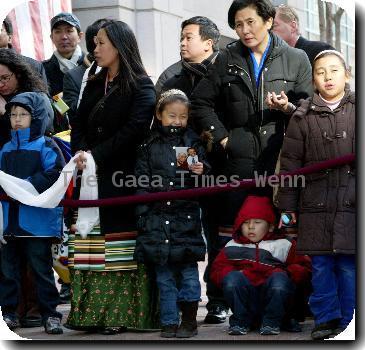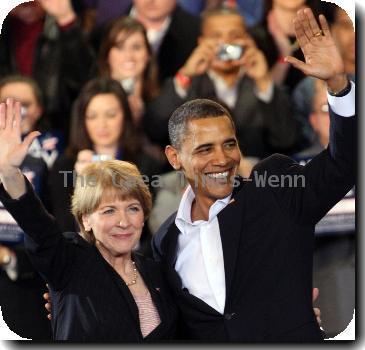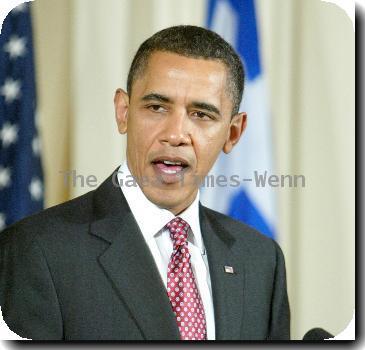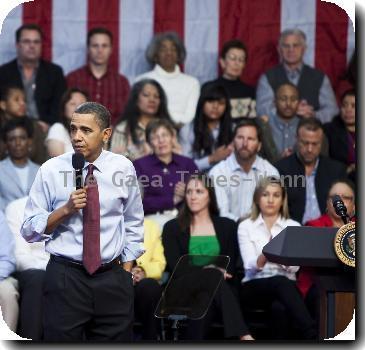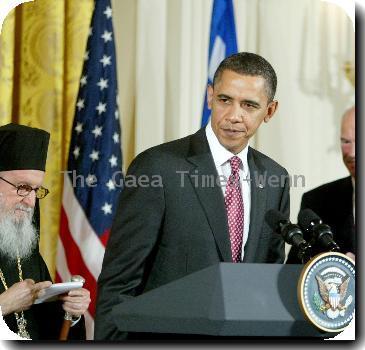Heavy shooting breaks out in Kyrgyz capital after president refuses to cede power
By Peter Leonard, APThursday, April 8, 2010
Kyrgyz opposition says it will rule for 6 months
BISHKEK, Kyrgyzstan — Opposition leaders moved to consolidate their control over Kyrgyzstan after their victory in a bloody uprising, saying they would hold power for six months and assuring the U.S. it can keep a strategic air base here — at least for now.
There were signs of instability, though, as deposed President Kurmanbek Bakiyev refused Thursday to relinquish power after the revolt, which left at least 75 people dead and hundreds wounded. As he spoke, gunfire broke out after nightfall in the capital, Bishkek; there were no reports of casualties Friday from the nighttime shooting.
Roving bands of armed marauders trawled the streets of the capital overnight, despite warnings from the opposition leadership that looters would be shot. Newly appointed security officials warned they would use every means to restore calm.
A mourning ceremony for clash victims was planned for later Friday in Ala-Too Square near the government headquarters and security was likely to be heavy amid the intense emotions there.
The former Soviet nation is home to a key U.S. military base supporting the fighting in Afghanistan that opposition figures have in the past said they wanted to see shut down. Kyrgyzstan also hosts a Russian military base and is the only nation where both Cold War foes have bases.
Roza Otunbayeva, a former foreign minister now heading the interim government, said there were no plans yet to review the lease agreement for the Manas air base, which runs out in July. She said her government would meet U.S. diplomats for talks in Bishkek.
“Give us time, it will take time for us to understand and fix the situation,” Otunbayeva said.
U.S. military officials said Kyrgyzstan halted flights for 12 hours Wednesday, confining troops to the air base; they did not say if flights had resumed. Some 1,100 troops are stationed there, including contingents from Spain and France, in support of NATO operations in Afghanistan.
President Barack Obama and Russian President Dmitry Medvedev discussed Kyrgyzstan before signing an arms treaty in Prague on Thursday.
Michael McFaul, Obama’s senior director for Russian affairs, emphasized that the U.S. did not view the conflict as any kind of proxy struggle between the U.S. and Russia.
“The people that are allegedly running Kyrgyzstan … these are all people we’ve had contact with for many years,” McFaul said. “This is not some anti-American coup, that we know for sure. And this is not some sponsored-by-the-Russians coup, there’s just no evidence of that.”
Kyrgyzstan shares a 533-mile (858-kilometer) border with China and is a gateway to energy-rich Central Asian countries where the U.S., China and Russia are competing for dominance. China said it was “deeply concerned” about the violent uprising in its small western neighbor, echoing comments by the United States and Russia.
Otunbayeva said parliament had been dissolved and that she would head an interim government for six months before elections are called. She said the new government controlled four of the country’s seven regions and called for Bakiyev to admit defeat.
“His business in Kyrgyzstan is finished,” she said.
In a sign that Russia may lend its support to the opposition, Prime Minister Vladimir Putin called Otunbayeva on Thursday. Any suggestion that Russia is backing the new leadership would add to the pressure on Bakiyev to step down.
Russia sent in 150 paratroopers to its base to ensure the safety of the 400 military personnel and their families there, Russian state media reported.
Bakiyev, who fled the northern capital for his stronghold in the south, told a Russian radio station that “I don’t admit defeat in any way.” But he also said he recognized that “even though I am president, I don’t have any real levers of power.”
“What has taken place is a veritable orgy carried out by armed groups and I do not believe this is a defeat for me,” Bakiyev said.
He spoke from southern Jalal-Abad region, where Bakiyev’s popularity is said to remain high — raising concerns he might try to secure his survival by exploiting the split between the more urban north and rural south.
Since coming to power in 2005 amid street protests known as the Tulip Revolution, Bakiyev had ensured a measure of stability. But the opposition said it came at the expense of democratic standards and accused Bakiyev of enriching himself and his family.
Many residents of Bishkek expressed wariness about the future.
“We have kicked out Bakiyev, the people have taken power into their own hands, but we have no plans for the future,” said Abdykerim Sadykov, a 42-year-old teacher in the crowd outside the government headquarters, which is known as the White House. “We will wait until the opposition hatches a plan.”
On Thursday, details emerged of the composition of the interim Cabinet, which has been drawn from a broad spectrum of opposition leaders, whose differences in the past have undermined attempts to weaken Bakiyev.
One area of consensus was on the decision to repeal sharp increases in heating and electricity bills that provoked widespread anger and helped precipitate this week’s violence.
Azimbek Beknazarov, a populist taking over a broad justice portfolio, vowed that the incoming authorities would hunt down those responsible for deaths in deadly clashes Wednesday between security forces and protesters.
“We are looking for those people that gave the order to open fire on demonstrators,” he said. “We must find these criminals, we will not allow anybody to open fire on their own people.”
Associated Press writers Leila Saralayeva and Yuras Karmanau in Bishkek, Lynn Berry, Mansur Mirovalev, Nataliya Vasilyeva and David Nowak in Moscow contributed to this report.
Tags: Asia, Barack Obama, Bishkek, Central Asia, China, District Of Columbia, East Asia, Eastern Europe, Europe, Greater China, Kyrgyzstan, Military Facilities, North America, Protests And Demonstrations, Russia, United States, Vladimir Putin

